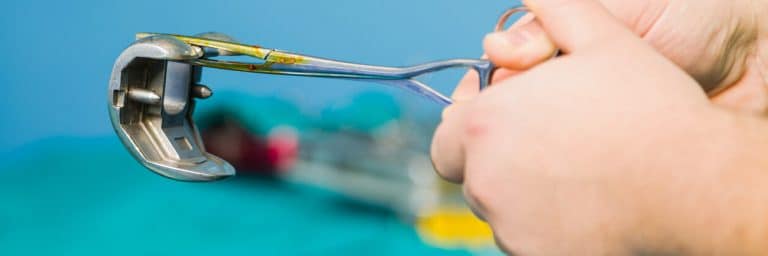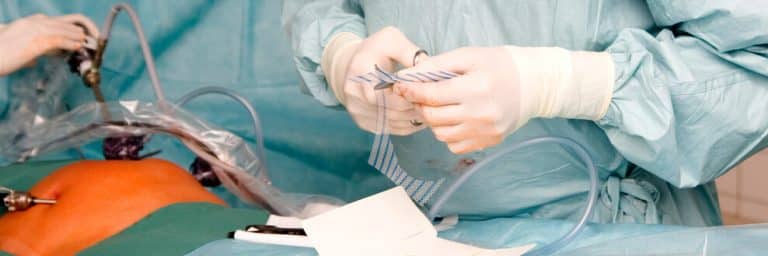According to the U.S. Government Accountability Office, sales for 102 medical device companies in the United States increased 43% between 2005 and 2014.(2) Those numbers may give medical device manufacturers a reason to cheer. A good profit margin always boosts the morale of CEOs.
However, if you have been injured by a medical device, someone else’s profit margin may be the last thing on your mind. What you need right now is for someone to listen to you and take you seriously. You need someone who can provide you with dependable legal guidance and assistance. That is where Weitz & Luxenberg comes in.
Defective Medical Device Lawsuits
If you have been injured by a faulty medical device, Weitz & Luxenberg may be able to help. Our firm has 30 years of experience in complex, large-scale, medical-related litigation. Over the years, we have represented hundreds of thousands of people. Our Weitz & Luxenberg lawyers are prepared to guide you through the legal process.
Weitz & Luxenberg is a national law firm. No matter where you live in the U.S. or which manufacturer made the medical device that harmed you, we are prepared to represent you and stand up to corporations or medical manufacturers of any size.
We do not back down from global medical manufacturers that have produced and distributed faulty, harmful medical devices. We stand by our clients, and we guarantee you can depend on us for solid, experienced guidance and legal counsel.

Defective Medical Device Lawyers
Not all medical devices are required to undergo comprehensive scientific and regulatory review before being marketed and sold in the United States. This is because a medical device manufacturer who believe that its device is “substantially equivalent” to a predicate device (one that has been cleared by the FDA or marketed before 1976) can apply to enter the U.S. market under the FDA 510(k) process. The 510(k) process bypasses the rigorous FDA Premarket Approval (PMA) process to evaluate the safety and effectiveness of new Class III medical devices. The purpose of a FDA 510(k) submission is to demonstrate that a device is “substantially equivalent” to a predicate device. Unlike the PMA process, which requires a manufacturer to present scientific evidence to assure that the device is safe and effective for its intended use(s), the 510(k) application submitter merely compares and contrasts its device with one or more predicate devices, explaining why any differences between the new and predicate device should not affect functioning. Clinical studies are usually not required for a 510(k) submission. Depending on the type of 510(k), the law gives the FDA either 30 or 90 days to decide “whether the device is equivalent to a device already” approved for distribution, ask further questions, or reject the application.(3)
For a free consultation and more information about your legal options, please contact us today.
Get a Free Case ReviewAlthough the FDA continues to monitor 510(k) medical devices after approval, such as through the FDA’s MAUDE (Manufacturer and User Facility Device Experience) database,(4) manufacturers are primarily responsible for tracking, following-up on, and reporting adverse events occurring in patients using their products.
Sometimes, FDA approves a medical device and then growing clinical evidence demonstrates the serious harm the device causes when brought to market without being adequately tested by manufacturers for human safety.(5) (6)
If you have suffered medical complications linked to a faulty medical device, you have a right to seek compensation from the device manufacturer. At Weitz & Luxenberg, our defective medical device lawyers are here to help.
Currently, we are accepting clients who have been harmed by certain types of:
- Hip, knee, and shoulder implants
- Surgical hernia mesh
If you have been injured by a defective medical device, Weitz & Luxenberg wants to hear from you. We offer a free consultation. One of our attorneys can help you review and understand your legal options.
Medical Device Recalls
Although many of the medical devices we use at home, buy in stores, or see in a medical facility have been approved by the FDA, that does not necessarily mean they are safe. Manufacturers frequently issue medical device recalls for products that were approved by the FDA.
You may hear about defective medical device recalls by watching or reading the news. In addition, you can search the FDA’s database for the most updated information.
Medical Device Recalls
Although many of the medical devices we use at home, buy in stores, or see in a medical facility have been approved by the FDA, that does not necessarily mean they are safe.”
According to the FDA, the agency “posts summaries of information about the most serious medical device recalls.” Devices are included in those posts when the FDA believes that there is the possibility “they could cause serious health problems or death.”(7)
Whether or not a manufacturer has recalled a medical device, you still have the right to look into taking legal action if you have been injured by a faulty medical device. At Weitz & Luxenberg, we stay on top of all significant FDA medical device safety announcements and remain informed about all related legal proceedings.
If you believe you have suffered medical complications due to any kind of medical device, we encourage you to call us for a free consultation. We will be happy to discuss the legal options available to you.
Medical Device Complications: Metal-on-Metal Hip Implants
Total hip replacement (arthroplasty) is an orthopedic intervention. Some hip systems have been made out of all-metal materials.(8) It is estimated that more than one million people around the world have metal-on-metal (MoM) hip implants.(9)
Several models of all-metal hip implants have shown a higher-than-anticipated failure rate, leading to serious injuries or medical complications for patients. In response, the FDA has issued a number of safety communications and several recalls have been initiated.(10) (11)
Corrosion or wear between metal-on-metal parts can release chromium, cobalt, and titanium ions into the body. Metal debris can damage tissue and lead to a condition called metallosis – which can starve tissue of oxygen and lead to cell death, potentially causing a host of problems.(12) (13) Other complications from defective metal-on-metal hip implants may include:
- Adverse local tissue reaction
- Pain
- Swelling of the hip
- Limping or a change in ability to walk
- Loosening of the implant
- Nerve, muscle, and bone damage
- Pseudotumors or other types of aseptic lymphocytic vasculitis associated lesions (ALVAL)
- High levels of metal ions in the blood(14) (15) (16)
Correcting these issues often requires revision surgery, which subjects a patient to further risks and possible complications.
In recent years, a number of patients have experienced severe complications following metal-on-metal hip replacement surgery. In response, Weitz & Luxenberg has taken legal action against hip implant manufacturers.

DePuy Orthopaedics, Subsidiary of Johnson & Johnson, Ordered to Pay Out Big
In 2014, Weitz & Luxenberg Practice Group Co-Chair Ellen Relkin served a key role in multidistrict litigation against DePuy Orthopaedics, a subsidiary of Johnson & Johnson, regarding its defective articular surface replacement (ASR) metal-on-metal hip implant. Ms. Relkin helped secure a $2.5 billion settlement against DePuy on behalf of patients who had received the faulty implant.
More recently, in 2016, juries in separate trials sided against DePuy regarding its Pinnacle hip implant when it was used in a metal-on-metal configuration. They have awarded more than one billion dollars across multiple suits to plaintiffs related to defective Pinnacle hip implants. DePuy faces thousands of additional lawsuits pending nationwide regarding its defective Pinnacle hip.(17)
Smith & Nephew Hip Implant Components
A growing body of medical literature is linking the Smith & Nephew EMPERION hip implant system to sudden fractures of the implant. In addition to discussing high rates of failure due to implant fracture, the Australian Joint Registry has identified the Emperion as having a significantly higher percentage of revisions than other primary total hip replacements, with more than two times the risk of revision occurring with the Emperion.(18) (19) (20) (21)
Weitz & Luxenberg continues to accept cases involving faulty Smith & Nephew EMPERION hips along with Modular SMF and Modular REDAPT models, the latter of which have been recalled due to potential for higher risk of revision.(22) If you suffered complications after receiving one of these Smith & Nephew hip implants, we encourage you to contact us.

Stryker Expected to Compensate Implant Recipients
In November 2014, and then extended in December 2016, Stryker Orthopaedics agreed to a $1 billion settlement with patients implanted with its Rejuvenate and ABG II modular neck stems. Stryker “expects the majority of the payments under the expanded settlement agreement will be made by the close of 2017.”(23)
Weitz & Luxenberg’s Ellen Relkin is credited with playing a key role in this settlement.
Stryker Recalls LFIT V40 Femoral Head
In August 2016, Stryker recalled certain lots and sizes of its LFIT Anatomic Cobalt Chromium V40 Femoral Heads (LFIT V40 femoral heads) due to the company receiving complaints of taper lock failure.(24) Taper locks are located at the junction where the femoral head attaches to the stem of the hip implant.
In April 2017, Panel on Multidistrict Litigation agreed to consolidate more than two dozen lawsuits pending against Stryker into a multidistrict litigation in the District of Massachusetts.(25)
Plaintiffs claim the LFIT V40 femoral heads can release toxic and corrosive cobalt into people implanted with the devices, potentially necessitating revision surgery. The complaints state the corrosive effects can be severe enough to cause the femoral heads to break off and become separated from the rest of the implant.(26)
Wright Medical Agrees to Pay $240 Million
In 2016, Wright Medical Group agreed to settle more than 1,200 lawsuits over its metal-on-metal Conserve, Lineage, and Dynasty hip implants.(27) As co-lead counsel, Weitz & Luxenberg’s Ellen Relkin again played a role in crafting the $240 million settlement agreement.
A Class 1 recall is the most serious. The FDA issues a Class 1 recall in situations “in which there is a reasonable probability that the use of or exposure to a violative product will cause serious adverse health consequences or death.”(30)
In 2015, MicroPort’s Profemur Neck Varus/Valgus CoCr 8 Degree modular neck was voluntarily recalled, with the FDA classifying this as a Class 1 recall. Originally, Wright Medical designed and manufactured this modular neck, but Wright’s OrthoRecon Business was acquired by MicroPort Scientific Corporation in June, 2013.(28) (29)
A Class 1 recall is the most serious. The FDA issues a Class 1 recall in situations “in which there is a reasonable probability that the use of or exposure to a violative product will cause serious adverse health consequences or death.”(30)
The FDA’s safety alert warned that the modular neck could fracture, requiring emergency revision surgery. The FDA said a sudden fracture “could lead to neurovascular damage, hematoma, hemorrhage, and even death.”(31)
If you have been injured by a Wright Medical Conserve, Lineage, or Dynasty hip implant or by a Profemur Neck Varus/Valgus CoCr 8 Degree modular neck requiring revision surgery, you may want to consult an experienced attorney. The attorneys at Weitz & Luxenberg offer a free consultation. We can help you consider your legal options.
You May Have Medical Device Complications with Knee Implants
Following knee implant surgery, some pain is to be expected. However, some problems and complications may be serious.(32)
- Infection: If your implant has become infected, you may need to have a revision, or corrective, surgery to replace the infected joint and clear the infection.
- Dislocation: Suffering from a dislocation “can cause sudden pain and inability to walk.” If this occurs, you may need to visit the emergency room.
- Loosening: Whether shortly after surgery or over time, loosening of the implant may cause pain. A revision surgery may be necessary.

Zimmer Facing Lawsuits Over Knee Implants
In 2010, Zimmer recalled components for several versions of the company’s NexGen Complete Knee Solution.(33) (34) As of June 2017, cases are still pending in a multidistrict litigation in Illinois.(35)
More recently, in 2015, Zimmer Biomet voluntarily recalled more than 11,000 components used in the Zimmer Persona Knee Personalized Knee System after complaints of loosening and radiolucent lines. The FDA categorized the recall as Class 2.(36)
If you had a Zimmer Persona Knee Personalized Knee System implanted and required revision surgery, we encourage you to call Weitz & Luxenberg. We offer a free consultation and can offer guidance about your legal options. Call us if you have had any of these complications:
- Loosening of the implant
- Pain
- Early implant failure
- Revision of the knee
Smith & Nephew Could Face BCS Knee System Lawsuits
The Smith & Nephew Journey Bi-cruciate Stabilized (BCS) Knee replacement system (Journey I BCS Knee System) received 510(k) approval from the FDA in 2005. However, in June 2018, the manufacturer issued an Urgent Field Safety Notice announcing the voluntary removal of the system’s femoral component from the market due to a higher than expected risk of revision in patients implanted with the knee replacement. (37)
This action was followed by the FDA classifying the recall as a Class II device recall for the Journey BCS Knee System on October 1, 2018. (38) The FDA’s recall was based upon device failure data.
Device failures were noted during the postmarket tracking and follow-up process, with data indicating revision surgery rates with the first generation Journey BCS Knee over 1.5 times higher than other knee replacement devices. These high revision rates were found in the National Joint Registry of England, Wales, and Northern Ireland and the Australian Orthopaedic Association National Joint Replacement Registry. (39)
The most common reason for device failure was component loosening. (40) According to the Hospital for Special Surgery, indications of total knee replacement component loosening include:
- Pain.
- Changes in alignment.
- Instability. (41)
When components in knee devices loosen, revision surgery is often required. Revision surgeries are expensive, are longer and more complex surgeries than initial knee replacement surgery, and have greater risk for complications. (42)
Follow-up care and physical therapy are typically needed. You may lose additional time from work or have complications, which can cost you even more money.
So, if you or a loved one had a Smith & Nephew Journey BCS Knee replacement system implanted that required revision surgery, or have been advised by your doctor that you need revision surgery due to femoral component loosening, we encourage you to contact Weitz & Luxenberg. The initial consultation is free, and we would be happy to provide guidance about your legal options.
Shoulder Implants May Suffer from Medical Device Complications
The complications you may suffer from after undergoing shoulder implant surgery with a defective shoulder device are similar to those of defective knee implants. These complications include:(43)
- Instability
- Fracture of the bone around the various implant components
- Loosening
If you experience unexpected or severe complications, let your health care provider know right away. Sometimes complications may require a revision, or corrective, surgery, or additional treatment.

Medical Device Complications: Surgical Hernia Mesh
According to the FDA, one million hernia repair procedures are performed each year in the United States.(44) Although the FDA has approved the surgical hernia mesh devices on the market today, the agency has issued warnings about possible complications, and notes that several meshes have been recalled.(45)
Complications of surgical mesh used in hernia repair include:(46)
- Adverse reactions to the mesh itself including pain, infection, and hernia recurrence
- Adhesions — when parts of the intestines stick to the mesh or each other
- Bowel obstruction
- Tissue perforation
- Damage to organs, blood vessels, and nerves near the mesh
- Mesh migration
- Mesh shrinkage (contraction)
Weitz & Luxenberg is accepting cases of complications occurring with these surgical meshes used in hernia repair:
- Atrium C-QUR meshes
- Covidien Parietex, Parietex Composite, Covidien Parietex Progrip meshes
Some complications reported with these brands include:(47) (48) (49) (50)
- Loss of coating on mesh after implantation
- Failure of mesh to incorporate/adhere to tissues
- Bowel obstructions
- Mesh failure
- Perforation of the intestines
- Migration from the surgical site
- Seromas – pockets of fluid that build up under the skin
- Revision, or corrective, surgery
- Infection
- Chronic pain
- Hernia recurrence
If you have suffered medical device complications requiring hospitalization or corrective surgery due to problems with the mesh used in your hernia repair, you may be entitled to compensation for medical costs and other expenses. Weitz & Luxenberg invites you to contact the firm for a free consultation to help you understand your legal options.
Hear From Our Clients
You have helped me to close a very difficult chapter in my life, both emotionally and financially, and I am incredibly grateful to you. About a day after I received my check and had deposited it, the reality of what you and your firm accomplished on my behalf finally sunk in — I cried. I feel victorious and that in some small way justice has prevailed for the little guy (gal) over the corporate giant. Thanks for leveling the playing field.”
Leslie H.
Defective Medical Device Lawyers: How Weitz & Luxenberg Can Help
We have represented thousands of clients across the country, winning more than $17 billion on their behalf.”
As a national law firm with more than 30 years of experience winning complex, large-scale, defective medical device lawsuits, Weitz & Luxenberg is prepared to take on the challenging cases. We have represented thousands of clients across the country, winning more than $17 billion on their behalf.
If you have been injured by a medical device, we urge you to call us now. We offer a free consultation and can help you consider your legal options.
You can reach us by phone at (833) 977-3437 or fill out the form on this page. One of our representatives will contact you shortly.
Although a past record does not guarantee future success, Weitz & Luxenberg has the experience and resources necessary to stand up to the large manufacturers of defective medical devices.